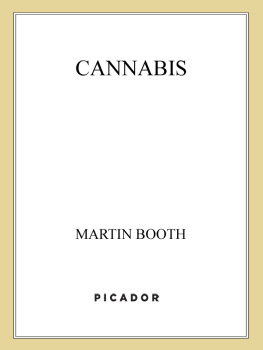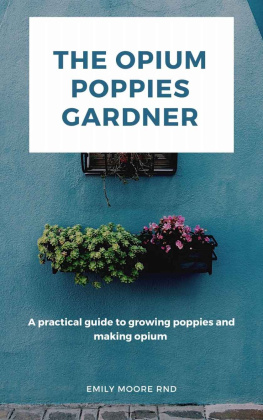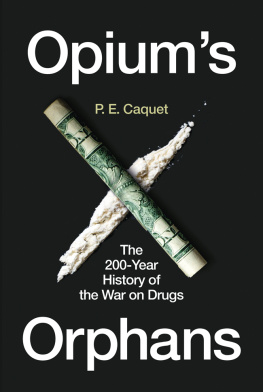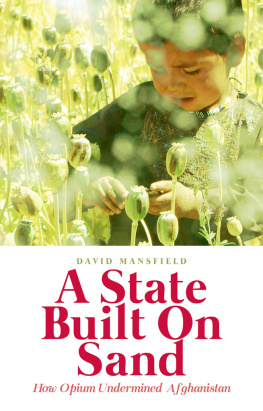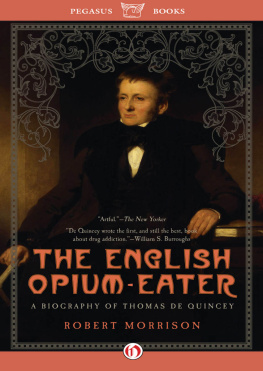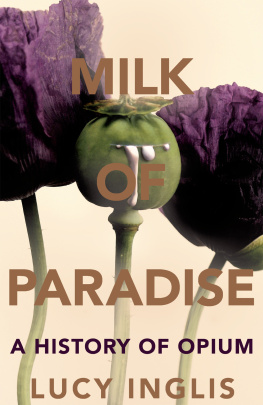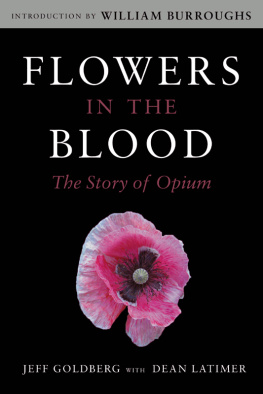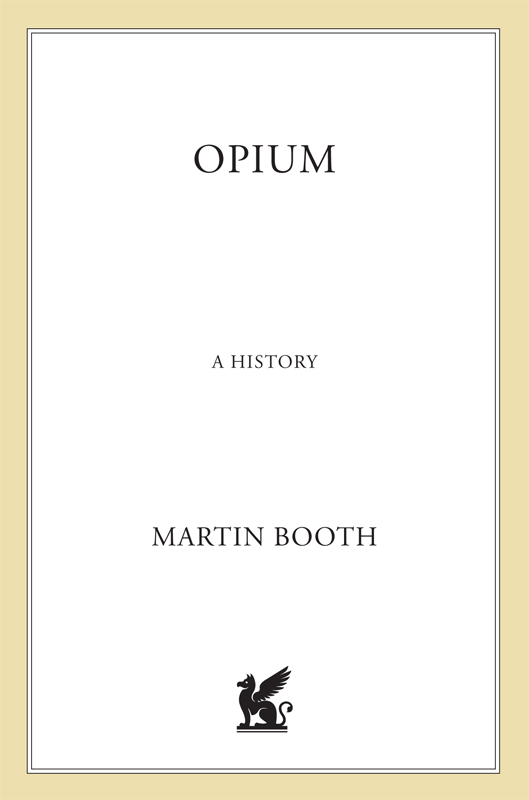
The author and publisher have provided this e-book to you for your personal use only. You may not make this e-book publicly available in any way. Copyright infringement is against the law. If you believe the copy of this e-book you are reading infringes on the authors copyright, please notify the publisher at: us.macmillanusa.com/piracy.
Contents
Opiatean unlocked door in the prison of identity. It leads into the jail yard.
Ambrose Bierce, The Devils Dictionary
Everything one does in life, even love, occurs in an express train racing toward death. To smoke opium is to get out of the train while it is still moving. It is to concern oneself with something other than life or death.
Jean Cocteau
Acknowledgements
I am indebted to a large number of people for their considerable assistance, support and encouragement in the researching and writing of this book. To the following I offer my heartfelt gratitude for, without them, the task could not have been completed: Dr Terry Boyce of the University of Hong Kong; Dr Ingrid Hook and the staff of the Department of Pharmacognosy, School of Pharmacy, Trinity College, Dublin; the librarian and staff of the University of Hong Kong Library; John Keep, H.M. Customs & Excise, London; A. Renouf, H.M. Customs & Excise, Jersey; J.L.S. Keesing, Royal Botanical Gardens, Kew; Dr Neil Bruce of the Institute of Biotechnology, Cambridge University; Dr Brigid Allen, the Archivist, Jesus College, Oxford; Jeffrey Robinson; Kevin Laurie of the Police Tactical Unit, Royal Hong Kong Police; William L. Ruzzamenti, Office of Congressional & Public Affairs, the US Department of Justice; Vera Savko of the Mayors Office, St Petersburg; Roger Lewis of the Centre for HIV/AIDS and Drugs Studies, Edinburgh; Superintendent Clive Tricker and Sen. Insp. Ricky Fung Hing-nam of the Narcotics Bureau, Royal Hong Kong Police; Maureen Sheehan, the Poppy Advisory and Control Board, Tasmania; Dr Harry Payne and David Mercer of MacFarlan Smith, Ltd; the Intelligence Division of the US Drug Enforcement Administration; Cathay Pacific Airways; John Powell, Somerset County Libraries; Murray Pollinger, my literary agent and a large number of people in Britain, the USA, Hong Kong, Thailand, Russia and Eastern Europe who operate at the barricades of the war against heroin and other drugs and who, for security reasons, must remain anonymous, but who have my considerable admiration.
Finally, my wife Helen whose considerable skill and research assistance, patience, forbearance and months before a computer monitor were utterly invaluable and without which this book would not have been written.
Foreword
In 1398, the following words were translated from the writings of John de Trevisa: Of popy comyth iuys that physycyens callyth Opium other Opion. Approximately two years later, in Lanfranks Science of cirugie, appeared the advice, It is not yuel to putte a litil opium to e oile of e rosis. What the physicians used opium for, or what good it did when mixed with oil of roses, was not stated until Jerome of Brunswick published his The noble experyence of the vertuous handyworke of surgeri. Translated into English in 1525, it contained an early reference to opium as a medicinal drug: Whan the payne is grete, then it is nedefull to put therto a lytell Opium.
Few nouns can be more evocative than opium. Derived from the ancient Greek for the sap of the poppy pod, it has moved a long way from its original innocent meaning. It simultaneously conjures up exotic images of murky drug dens filled with besotted addicts, white slavers and Fu Manchu-like fiends, maudlin and tubercular Romantic poets and, by association, alleyways across the cities of the world littered with discarded hypodermic needles, trained sniffer dogs going over airline baggage, haggard youths shooting up heroin in public lavatory cubicles, AIDS sufferers and prostitutes, mafiosi, drug barons riding in sleek limousines, machine-gun-toting smugglers, street-corner peddlers and Hollywood gangster movies.
To an addict, opium and its derivatives are the raw substance of dreams, the means of escape from reality and temporary entry into heaven or at least another place apart from the here and now: it is also slave-master, cruel mistress and possessive lover. For narcotics agents, law enforcement or customs officers, opium is the source of the evil by the hunting down of which they earn a salary and may lose their life. To politicians and their secret service operatives, it is the ideal substance of subversion and political instability. Those dedicated to the eradication of drugs from society regard it as being just as much their raison dtre, their quest, even their holy grail, as it is the junkies: they both search for it with a zealots avidity. For the racketeer, opium is a means to considerable wealth for a comparatively low capital outlay. And there are those who find it has other uses: poisoners kill with it and have done so since at least Roman times; terrorists finance mayhem with it; urban crime is fuelled by it; arms dealers use it as a form of currency and governments are either blackmailed by it or employ it to corrupt or to apply pressure to other administrations, nations or political adversaries. Opium (in the form of heroin) accounts for an illicit multi-national trade which is larger than that of many countries.
In short, society is undermined some might say underpinned by opium.
Yet for all these detrimental aspects, opium has a benign side. The economies of some countries depend upon it, the opium harvest being all that stands between social stability and political overthrow, well-being and disease or starvation. Many a Third World peasant farmer regards opium as a steady, reliable, easily grown and harvested cash crop. For the terminal cancer patient, opium and its derivatives afford a blessed relief from the tortures and indignities of pain. Even a passing headache can be eradicated by an opiate bought over the counter of many a pharmacists shop.
In other words, opium and its derivatives are all things to all men and have been so for centuries.
The story of opium goes back well before the nineteenth century invention of heroin, opium clippers riding the South China Sea, the discovery of morphine, poets habituated to laudanum, the rudimentary pharmacology of the Middle Ages and the political machinations of ambitious Roman murderers. It has its origins in the start of human society and its use almost certainly pre-dates civilisation. In fact, there seems little doubt that opium was one of the first medicinal substances known to mankind.
Raw Opium
The opium poppy is botanically classified as Papaver somniferum. The genus is named from the Greek noun for a poppy, the species from the Latin word meaning sleep inducing: it was Linnaeus, the father of botany, who first classified it in his book Genera Plantarum in 1753. Like many of his contemporaries, and generations before him, he was well aware of its capabilities.
The plant has a dubious history. Some horticulturists consider it evolved naturally, but there are others who claim it is a cultivor developed by century upon century of careful human cultivation. Another theory is that it is a naturally mutated plant which evolved because of a quirk of climate or altitude. This is not far-fetched for plants will take on atypical forms in unique conditions: the cannabis trees of Bhutan prove the point. No one can be certain.
Although there is no positive proof, it is thought P. somniferum may have evolved, or been generated, either from the wild poppy, Papaver setigerum, which contains small amounts of opium and which indigenously grows throughout the countries bordering the Mediterranean Sea, or from a poppy native to Asia Minor.




